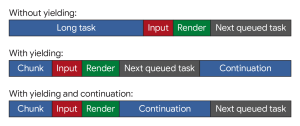How Do Online HTML Compilers Handle Long-Running Processes?
admin
- 0
Online HTML Compilers Handle Long-Running Processes
HTML is a markup language that describes the structure and content of web pages. It’s often used in conjunction with CSS to control the appearance and styling of web content. Online html compilers simplify the development process by providing a coding environment with real-time output previewing. They also eliminate the need for local installations. These benefits make them valuable tools for both seasoned developers seeking efficiency and beginners eager to experiment safely.
When you write an HTML file, the web browser parses it and constructs a Document Object Model (DOM) tree. The DOM tree reflects the relationships and hierarchies of the elements in your HTML document. The larger the DOM tree, the longer it takes to parse and build.

While this process occurs, the browser can’t access or load any resources such as images and scripts. This can stall the parsing and rendering process, causing your webpage to load slowly. Fortunately, some web browsers have a feature called the preload scanner that prioritizes and downloads high-priority assets like CSS, JavaScript, and web fonts. It works by analyzing the current state of your compiler for html page and detecting references to external assets that need to be loaded.
How Do Online HTML Compilers Handle Long-Running Processes?
The preload scanner then retrieves those assets and places them in a queue for processing by the main parser. This reduces the amount of time the main parser spends downloading resources, which allows the main thread to continue processing HTML and constructing the DOM tree. However, some script> tags without the async or defer attribute can block this process.
Additionally, many Online HTML Compilers come equipped with integrated tools and libraries. Developers can experiment with CSS (Cascading Style Sheets) and JavaScript alongside their HTML code, creating a more comprehensive testing environment. This integrated approach enables developers to visualize the interaction between different web technologies in real-time, facilitating a more holistic development experience.
Security is a common concern when it comes to online tools, but reputable Online HTML Compilers prioritize user privacy and code security. They often incorporate encryption protocols and secure connections to protect users’ code and data. Additionally, many platforms offer the option to save code snippets or projects securely, allowing developers to revisit and iterate on their work without compromising data integrity.
In order to prevent this from happening, you should always use valid HTML code. You should also stick to standard naming conventions for your tag names, classes, and IDs. This makes it easier to understand your code and locate problem areas. Finally, be sure to keep up with the latest HTML standards and updates. This way, your code is less prone to errors and will display consistently across browsers. In addition, it’s a good idea to test your HTML code in multiple browsers before publishing it. Browsers interpret HTML differently, and a consistent user experience is essential.